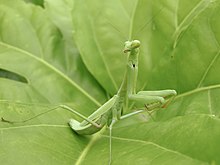Carolina mantis
This article includes a list of general references, but it lacks sufficient corresponding inline citations. (August 2012) |
| Carolina mantis | |
|---|---|

| |
| Adult female | |
| Scientific classification | |
| Domain: | Eukaryota |
| Kingdom: | Animalia |
| Phylum: | Arthropoda |
| Class: | Insecta |
| Order: | Mantodea |
| Family: | Mantidae |
| Genus: | Stagmomantis |
| Species: | S. carolina
|
| Binomial name | |
| Stagmomantis carolina (Johansson, 1763)
| |
| Synonyms | |
|
List
| |
The Carolina mantis (Stagmomantis carolina) is a species of praying mantis of the subfamily Stagmomantinae.
Sexual cannibalism occurs in roughly one quarter of all intersexual encounters of this species, though specimens of this species will engage in cannibalism regardless of age or gender if the opportunity presents itself.[3]
The Carolina mantis is the state insect of South Carolina. Oothecae can be purchased in garden supply centers as a means of biological control of pest insects. However, only those labeled as this species should be released because most oothecae sold in the United States belong to the non-native Chinese mantis.
Description
[edit]
Adult females are 47 to 60 millimetres (1.9–2.4 in) in length while adult males are usually about 54 millimetres (2.1 in) in length.[5] First instar nymphs are 7–12 millimetres (0.28–0.47 in) in length. When the nymphs eat more, their abdomens get much longer.
The Carolina mantis has a dusty brown, gray or green color useful as camouflage in certain environments. The Carolina mantis' color varies because the nymphs are able to adjust their color to match the environment they are in at the time of molting. They can adjust their color over each molt, if necessary, until they reach their final molt to adulthood.
An unusual trait is that its wings only extend three-quarters of the way down the abdomen in mature females; this trait is also seen in Iris oratoria, which can be distinguished by the large eyespots on the hind wings (inner wings) of both adult male and female Iris oratoria.[3] Both adult male and female Stagmomantis carolina have a dark-coloured dot on each of their forewings (outer wings), which may be partially hidden in a brown or dark colour morph individual.
-
Female mating with a half-eaten male
-
Ootheca
-
1st instar nymph

Distribution and habitat
[edit]Stagmomantis carolina is native to the Americas and can be found from the United States southwards to Brazil.[2]
References
[edit]- ^ a b c Blatchley, Willis Stanley (1920). Orthoptera of northeastern America: with especial reference to the faunas of Indiana and Florida. The Nature Publishing Company. pp. 117–120.
- ^ a b Otte, Daniel; Spearman, Lauren; Stiewe, Martin B.D. "Mantodea Species File Online".
- ^ a b Mike Maxwell. "Sexual cannibalism, mate choice, and sperm competition in praying mantids". Archived from the original on 2007-12-22.
- ^ Maxwell, Michael R. (2014-02-21). "A synoptic review of the genus Stagmomantis (Mantodea: Mantidae)". Zootaxa. 3765 (6): 501–525. doi:10.11646/zootaxa.3765.6.1. ISSN 1175-5334.
- ^ "Praying Mantids | Entomology". entomology.ca.uky.edu. Retrieved 2024-03-17.
External links
[edit] Media related to Stagmomantis carolina at Wikimedia Commons
Media related to Stagmomantis carolina at Wikimedia Commons- "Mantis". Microsoft Encarta. Archived from the original on 2009-10-28. Retrieved 2008-01-24.
- Stabheuschrecken und Gottesanbeterinnen im Terrarium
- Sexual cannibalism, mate choice, and sperm competition in praying mantids
- Bugguide.net Species Stagmomantis carolina - Carolina Mantis
- David Edwin Hill: Carolina Mantis (Stagmomantis carolina) feeding on tettigonid cricket — Video
- "Stagmomantis carolina". The Encyclopedia of Life.



